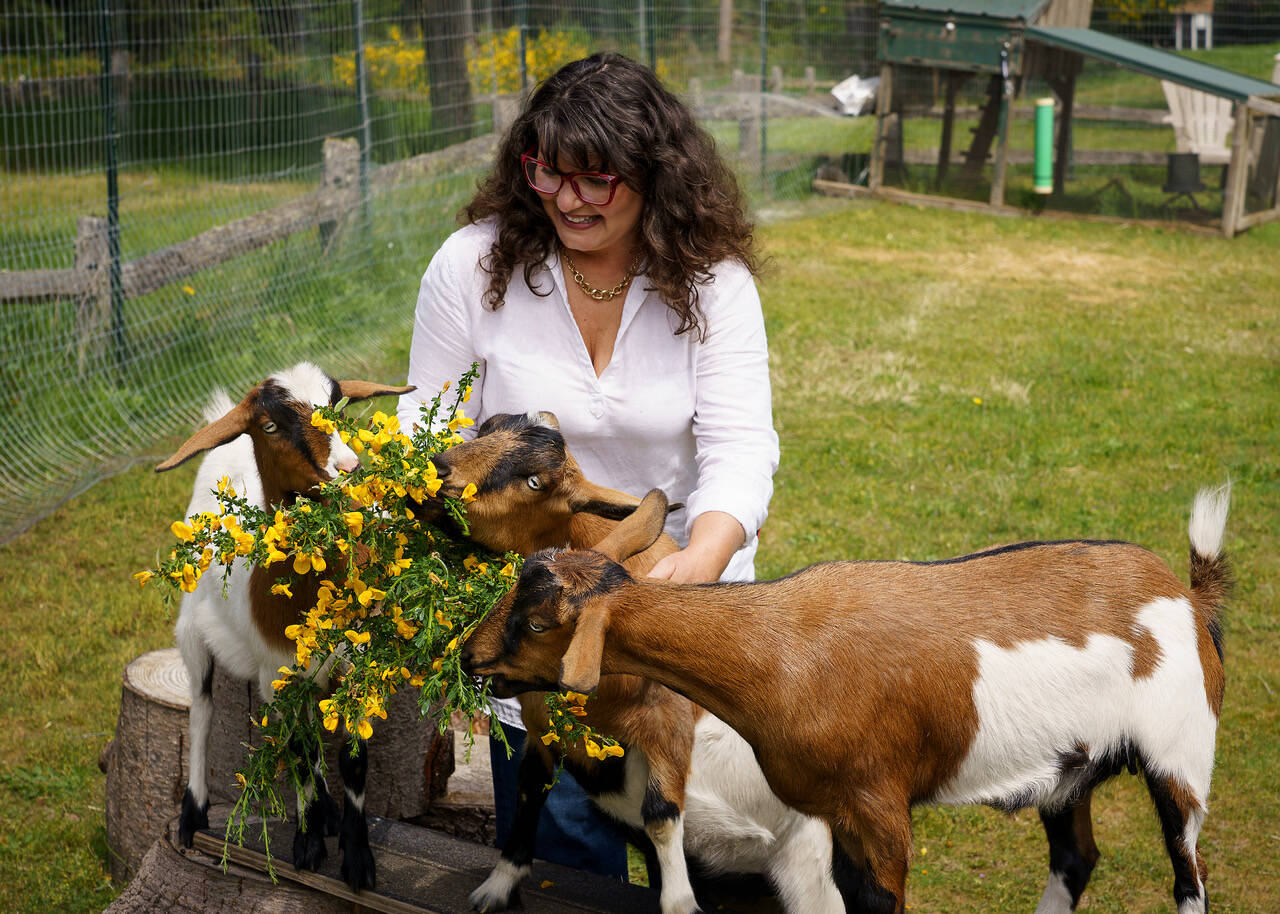For Marie Fiore and David Tsujimoto, starting their own farm and apiary has been an expansion of their love for food grown on Whidbey Island.
Around this time of year at Fainting Goat Farms, native pollinators are busily buzzing. Fiore and Tsujimoto keep mason and honey bees on their 10-acre regenerative farm, which also attracts bumblebees.
“If you plant it, they will come,” Fiore said with a laugh. They are currently growing several varieties of fruit trees, including Asian pears, persimmons, figs and quinces.
The fledgling farmers met in Seattle. Fiore is a longtime member of Slow Food USA, an organization dedicated to promoting local food. She and her husband are founding members of Whidbey Island Grown, a cooperative that sells food from producers on the island.
“Prior to this, I lived in the city and I was just eating fast food and all that,” Tsujimoto said. “When we met, she was involved with Slow Food and she just got me more educated about the importance of food, where it comes from, if it’s genetically modified or if they used pesticides. So the more and more we learned about it, the more we got drawn into just actually farming ourselves.”
The couple founded Fainting Goat Farms on South Whidbey about three years ago. The beekeeping started as a hobby, but Fiore has since amped up production because demand has soared for the pure, raw and unfiltered honey. With at least 60 hives, she is hoping to produce 400 pounds this year.
Though Fainting Goat Farms isn’t currently accessible to the general public, a farmstand on the property is open nearly every day and contains jars of honey and multi-colored eggs from the resident flock of hens, among other items. The couple is also raising American Bresse birds for meat, which Fiore referred to as “the Wagyu of chickens.”
And of course, Fainting Goat Farms wouldn’t be what it is without the three myotonic goats, who are named Peanut, Butter and Jelly. Myotonic goats — also known as fainting goats — possess a hereditary condition that causes them to stiffen or fall over when excited or startled.
Just over a year old, members of the small herd do not faint as much as when they were younger.
Low-flying helicopters, noisy Harley Davidson motorcycles on the nearby roadway and a bald eagle snatching a chicken are among some of the things that have caused them to faint.
“The first time Peanut jumped on the teeter totter, the other two fainted,” Fiore said. “They were so afraid for her.”
Peanut enjoys balancing on a teeter totter within the enclosure. At night, her owners can watch her and the other two goats with the use of a security camera. Because of this, they know Peanut has used the teeter totter in the early hours of the morning.
During the winter, the myotonic goats get heavy, curly coats.
“There was a woman who argued with me on Facebook that they were sheep,” Fiore said.
The couple is currently working with the Whidbey Island Conservation District to come up with a nutrient management program that doesn’t rely on synthetic fertilizer. That’s the job of the goats and chickens, to produce fertilizer.
Though neither Fiore nor Tsujimoto have extensive backgrounds in farming, Tsujimoto’s family grew a variety of heritage strawberries on Bainbridge Island before World War II. During the war, family members were forcibly removed from their homes, and his mother was interred at a concentration camp in Idaho for American citizens with Japanese ancestry.
“It’s not a story that was widely shared, and I don’t know that a lot of the rest of America knows,” Fiore said of the concentration camps.
She and Tsujimoto are currently growing starts for those same berries his family grew. Known as Marshall strawberries, they are on the Slow Food Ark of Taste, a catalog of delicious and distinctive foods facing extinction.
“James Beard once said that it was the best-tasting strawberry in the world,” Fiore said. “But they’ve stopped growing them because they don’t have a great shelf life.”
Two years ago, the couple received 200 starts of the Marshall strawberry from gardeners at a resort on Orcas Island as part of a project to bring back the variety in home gardens. Thanks to them, Fiore and Tsujimoto are helping to keep that heritage alive at Fainting Goat Farms.
In the future, they hope to host workshops and events at the farm.
For more information, visit faintinggoatfarms.com.



